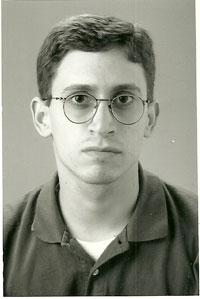
PhD, Spanish and Portuguese, Columbia University, 2005
University of New Hampshire
McNair Scholar, 1997 & 1996
Major: Spanish and Music
1997 Mentor: William Forbes
1997 Research Topic: Octavio Paz and William Carlos Williams: A Discovery of the National
1996 Mentor: Lester A. Fisher - Professor of English
1996 Research Topic: The Construction of a Nuyorican Identity in the Poetry of Tato Laviera
1997
Octavio Paz and William Carlos Williams: A Discovery of the National
The debate over the relationship between history and poetry can be traced back to Aristotle's Poetics (384-322 A.C.). In his work, Aristotle differentiated between the poet and the historian by assigning the first with those events that can happen –that is, events that are probable- and the second with those events that actually happen. This concern with history and poetry has survived until today and can be shown to still be a vital literary concern as seen in the work of William Carols Williams (1883-1963) and Octavio Paz (1914). Both of these poets show a very specific preoccupation with the subject, although both approach the problem from a different angle.
It is this interplay of history and poetry that leads me to formulate an even deeper question: How can the different degrees of interaction between history and poetry have a role in shaping the character of a nation? The search for the answer to this question raises an even more intriguing question, and that is: Could the Americas have a common literature guided by a common basic necessity? That is, even thought the final product is different, the reason for that difference is the same element. Which brings me to the central question that will guide my current research efforts: Can that common element be the historical consciousness, as least as far as Mexico and the United States of America are concerned?
With that purpose the poetry of Williams and Paz will be studies and analyzed in relation to the poetic production of their respective countries- the United States of America and Mexico -as they relate to the questions raised above.
1996
The Construction of a Nuyorican Identity in the Poetry of Tato Laviera
Identity has been in a state of constant instability throughout Puerto Rican history, due to Spanish and U.S. colonialism. The effects of the policies that the United States has imposed on the island have been numerous, among them an exodus that resulted in 2.5 million Puerto Ricans living in the United States, most in New York City. This study seeks to observe how a creative effort &endash; the poetry of Tato Laviera &endash; can construct and serve as a tool for understanding the identity of that group of people.
In determining Laviera's approach to assimilation I considered the solutions the poet presents regarding the issue of identity and the social implications of his philosophies. The processes that led to my conclusions were patient reading, analyzing and extracting of material from Laviera's complete poetical output, which consists of La Carreta Made a U-turn (1979), Enclave (1981), AmeRícan (1985), and Mainstream Ethics (1988). I also examined secondary sources such as the works of Juan Flores, René Marqués, Nicolas Kanellos, Ronald Takaki, Alexis De Tocqueville, José Luis González, and Virginia E. Sánchez Korrol.
My research indicates a sympathetic attitude towards cultural differences and a sense of self-acceptance on the part of the poetic personas reached through a process of conflict between opposing views and reflection upon the issues faced by Laviera's subjects.
